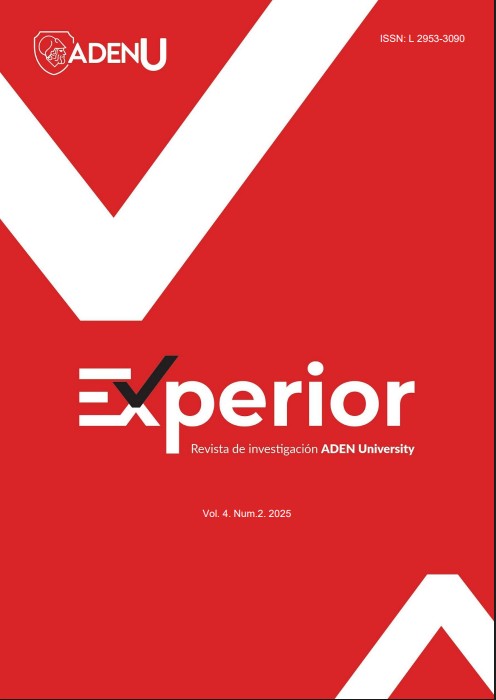The footprint of green marketing and corporate social responsibility in organizations
DOI:
https://doi.org/10.56880/experior42.4Keywords:
green marketing, corporate social responsibility, corporate sustainability, corporate legitimacy, shared valueAbstract
This study analyzes the relationship between green marketing and CSR, given the growing pressure for sustainability and the risk of greenwashing. The objective was to describe the impact of green marketing on organizations' corporate social responsibility, considering its potential to generate trust and competitive advantages when authentic. The central question guiding the research was: What is the impact of green marketing on organizations' CSR? A qualitative and documentary study was used, reviewing scientific articles, reports, business cases, and underlying theories. The thematic analysis identified eight axes: green marketing, CSR, greenwashing, sustainable consumption, regulations, stakeholder theories, and corporate legitimacy. The results showed that green marketing transcends advertising, integrating into CSR models such as Elkington's Triple Bottom Line, Shared Value, and stakeholder models, which align the interests of affected groups with companies such as Patagonia, Unilever, and IKEA, demonstrating that authentic green practices improve reputation and competitiveness and align with the SDGs. The conclusion is that green marketing leaves a positive impact on CSR when integrated strategically, ethically, and transparently, avoiding greenwashing. Its impact includes improved reputation, consumer loyalty, and a contribution to sustainable development, provided the actions are verifiable and structural.
Downloads
References
Ávila, H. (2006). Introducción a la metodología de la investigación. Eumed.net.
Báez, J. & de Tudela, P. (2009). Investigación cualitativa. Esic.
Carroll, A. B., & Shabana, K. M. (2010). The business case for corporate social responsibility: A review of concepts, research and practice. International journal of management reviews, 12(1), 85-105. https://doi.org/10.1111/j.1468-2370.2009.00275.x
Corona, J. L. (2018). Investigación cualitativa: fundamentos epistemológicos teóricos y metodológicos. Vivat Academia, (144), 69-76. https://doi.org/10.15178/va.2018.144.69-76
De León, A.I. (2024). Prácticas engañosas de greenwashing que permean el marketing ecológico. (Tesis Doctoral no publicada). Universidad del Caribe, Panamá.
Delmas, M. A., & Burbano, V. C. (2011). The drivers of greenwashing. California management review, 54(1), 64-87. https://papers.ssrn.com/sol3/Delivery.cfm?abstractid=1966721
Deshmukh, P., & Tare, H. (2024). Green marketing and corporate social responsibility: A review of business practices. Multidisciplinary Reviews, 7(3), 2024059-2024059. https://doi.org/10.31893/multirev.2024059
Elkington, J. (1997). Cannibals_with_Forks. Capstone Publishing Limited. https://www.academia.edu/42948589/Cannibals_with_Forks.
European Community. (2020). Corporate sustainability and responsibility. https://single-market-economy.ec.europa.eu/industry/sustainability/corporate-sustainability-and-responsibility_en
Fernández García, M. (2023). El uso del marketing digital y su impacto en el comportamiento del consumidor de la empresa Patagonia. (Tesis de Licenciatura). Universidad Rey Juan Carlos.
Freeman, R. E. (2010). Strategic management: A stakeholder approach. Cambridge University Press. https://goo.su/pr1wh
Gordillo, L. de J., Chirinos, Y. del V., Vega, C., y Ortega de la Cruz, E. C. (2024). Marketing verde y responsabilidad social: binomio estratégico para la sustentabilidad empresarial. Revista Venezolana de Gerencia: RVG, 29(12), 1129-1144. https://doi.org/10.52080/rvgluz.29.e12.16
Hernández, Y. & López D. (2012). El marketing ecológico y su integración en la planificación estratégica. Telos, 14 (2), 223-331. http://www.redalyc.org/articulo.oa?id=99323311005
IKEA. (2020). People & Planet Positive, la estrategia de sostenibilidad de IKEA: positivos para las personas y el planeta. © Inter IKEA Systems B.V. https://www.ikea.com/co/es/files/pdf/2e/21/2e214039/estrategia-sostenibilidad_-people-and-planet_-2020.pdf
ISO 14001. (2021). Sistemas de gestión ambiental — Requisitos con orientación para su uso. https://www.iso.org/es/norma/14001
ISO 14024:2018. (2018). Etiquetas y declaraciones ambientales. Etiquetado ambiental Tipo I. Principios y procedimientos. https://www.iso.org/obp/ui/#iso:std:iso:14024:ed-2:v1:es
Kartajaya, H., Kotler, P., & Setiawan, I. (2018). Marketing 4. 0: Transforma tu estrategia para atraer al consumidor digital. Editorial Almuzara.
Leonidou, C. N., Katsikeas, C. S., & Morgan, N. A. (2013). “Greening” the marketing mix: Do firms do it and does it pay off? Journal of the academy of marketing science, 41, 151-170. https://doi.org/10.1007/s11747-012-0317-2
Marín Dueñas, P. P., Gómez Carmona, D. & Cano Tenorio, R. (2022). Un estudio del comportamiento del consumidor ecológico. La transversalidad de la investigación en comunicación, 42-65. https://goo.su/mzLH
Muñoz-Martín, J. (2013). Ética empresarial, Responsabilidad Social Corporativa (RSC) y Creación de Valor Compartido (CVC). Journal of Globalization, Competitiveness and Governability, 7(3), 76-88. 10.3232/GCG.2013.V7.N3.05
Naciones Unidas. (2023). Informe de los Objetivos de Desarrollo Sostenible. https://goo.su/WPKtbC
OCDE. (2018). Iniciativas de sostenibilidad y conducta empresarial responsable en América Latina y el Caribe. OECD Business and Finance Policy Papers, https://doi.org/10.1787/bf84ff64-en.
Ottman, J. (2017). The new rules of green marketing: Strategies, tools, and inspiration for sustainable branding. Berrett-Koehler Publishers. https://bkconnection.com/static/The_New_Rules_of_Green_Marketing_EXCERPT.pdf
Papadas, K. K., Avlonitis, G. J., Carrigan, M., & Piha, L. (2019). The interplay of strategic and internal green marketing orientation on competitive advantage. Journal of Business Research, 104, 632-643. https://doi.org/10.1016/j.jbusres.2018.07.009
Parmar, B. L., Freeman, R. E., Harrison, J. S., Wicks, A. C., Purnell, L., & De Colle, S. (2010). Stakeholder theory: The state of the art. The academy of management annals, 4(1), 403-445. https://doi.org/10.1080/19416520.2010.495581
Patagonia. (2011). Don’t Buy This Jacket, Black Friday and the New York Times. https://goo.su/DmPid4
Peattie, K., & Crane, A. (2005). Green marketing: legend, myth, farce or prophesy?. Qualitative market research: an international journal, 8(4), 357-370. http://dx.doi.org/10.1108/13522750510619733
Porter, M. E. & Kramer, M. R. (2011). Creating shared value. Harvard business review, 89(1/2), 62-77. https://hbr.org/2011/01/the-big-idea-creating-shared-value
Ramos, A., Cavadas, D. & Horcajada, L. (2024). ¿Qué es el marketing verde y cómo beneficia a tu empresa? https://www.apd.es/marketing-verde-ventajas-desventajas/
Savitz, A. & Weber, K. (2013). The triple bottom line: how today's best-run companies are achieving economic, social and environmental success-and how you can too. John Wiley & Sons. https://goo.su/AzzZ8Sq
Suchman, M. C. (1995). Managing legitimacy: Strategic and institutional approaches. Academy of management review, 20(3), 571-610. https://www.downloadmaghaleh.com/wp-content/uploads/edd/9817.pdf
Suki, N. M. (2016). Consumer environmental concern and green product purchase in Malaysia: structural effects of consumption values. Journal of cleaner production, 132, 204-214. https://doi.org/10.1016/j.jclepro.2015.09.087
Tamayo y Tamayo, M. (1988). Aprender a investigar: la investigación. Arfo Editoriales Ltda.
Unilever. (2019). Unilever anuncia nuevos compromisos para un mundo libre de residuos. https://www.unilever.com.mx/news/press-releases/2019/unilever-anuncia-nuevos-compromisos-para-un-mundo-libre-de-residuos/
Uribe Arévalo, A. J. (2023). La responsabilidad del marketing verde. Tendencias, 24(2), 288-306. https://doi.org/10.22267/rtend.232402.236
Downloads
Published
Issue
Section
License

This work is licensed under a Creative Commons Attribution-NonCommercial 4.0 International License.










